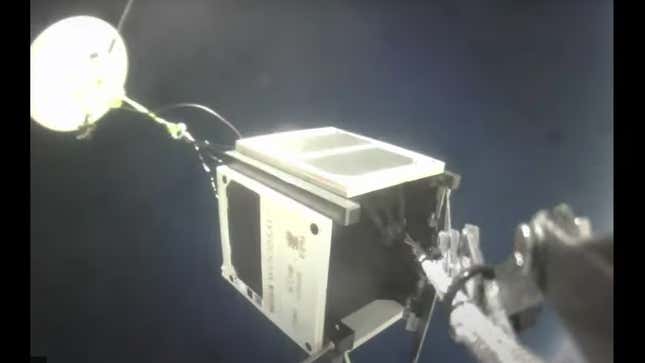
A Finnish team is full steam ahead on its plans to launch a satellite made of plywood into space by the end of 2021. The satellite will orbit between 300 and 400 miles above Earth and will be a proof-of-concept for future wooden instruments in space.
Named Woodsat, the satellite is made of birch with some aluminum and electronic components, and, at just 64 cubic inches, is technically a nano-satellite. The Woodsat team conducted a test launch over the weekend that saw the boxy satellite hit the stratosphere, nearly 20 miles above sea level, after being lifted there on a weather balloon. When the satellite eventually makes the jump to space—on a rocket out of New Zealand—it’ll be outfitted with a number of instruments provided by the European Space Agency to monitor its integrity.
“The first item we’re embarking is a pressure sensor, which will allow us to identify the local pressure in onboard cavities in the hours and days after launch into orbit,” said Riccardo Rampini, a materials scientist at the ESA, in an agency press release. “This is an important factor for the turn-on of high power systems and radio-frequency antennas, because small amounts of molecules in the cavity can potentially cause them harm.”
Off-the-shelf components have history in space. Most recently, NASA’s Mars rover Perseverance was launched with two commercial microphones, which recorded the sounds of Martian winds and even the helicopter, Ingenuity, in flight. However, Woodsat will be dried out in a vacuum chamber and given a thin layer of aluminum oxide to protect it in the vacuum of space.
The team hopes that putting relatively naked wood in space will improve their understanding of the wood’s utility in space instruments—at least for those spacecraft that remain in the cold recesses of the Great Out-There, and not too close to the Sun. An extendable camera pointed toward Woodsat will help them in that regard, showing any harm that befalls the little instrument.

The flight on Sunday tested Woodsat’s camera equipment and connection to instruments on Earth. When the satellite reached its acme, the balloon exploded and the satellite parachuted back down. In July, a duplicate of the satellite will undergo further trials at the European Space Research and Technology Center in the Netherlands, according to a WISA press release. This testing will supplement the stratospheric balloon test by mimicking the launch and space conditions of the flight.
You have to say, this project is something of a coup for birch wood. The Wright Brothers’ flyer was made of spruce, and balsa has had the model plane game locked down. Best of luck to this team.
More: Latest Starlink Launch Makes SpaceX the Largest Commercial Satellite Operator in the World